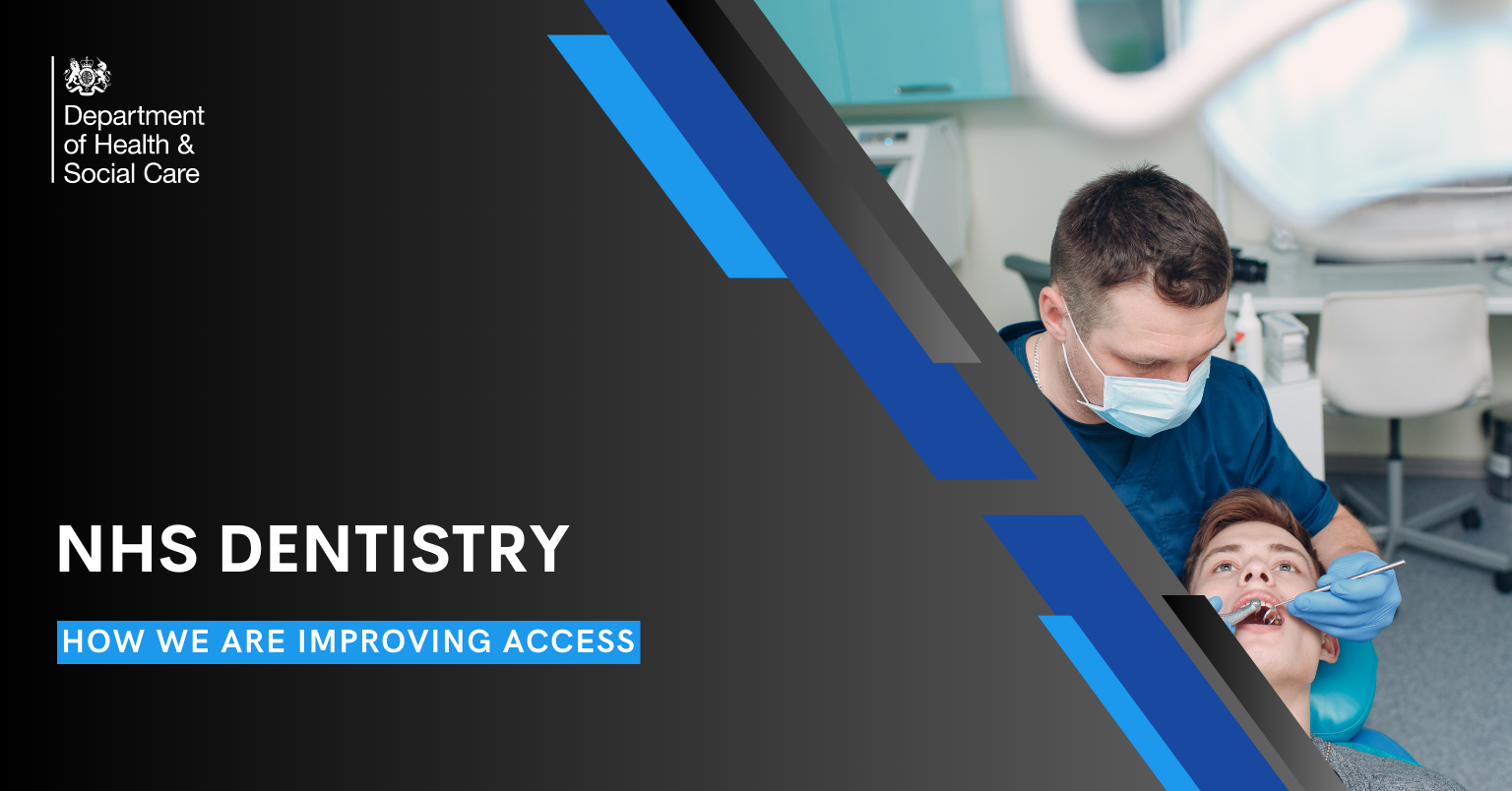
**Updated 29 September 2023**
This government is committed to improving access to dentistry.
We have already introduced a range of measures to improve access to NHS dentistry in England and we will soon publish a plan to boost access and improve services further.
Here’s everything you need to know about what we’ve done so far.
How are we helping more people get a dentist appointment?
- We’re investing more than £3 billion a year to deliver NHS dentistry.
- And last year we made the most significant changes to the dentistry contract since 2006, by introducing a range of reforms to encourage more dentists to offer NHS services and make it easier to get an NHS dental appointment.
- The reforms include:
- Increasing the amount of money practices receive for high-need patients by increasing the payments for more complex or high-volume treatments.
- A new requirement for dental practices to update the NHS website at least every 90 days, so patients are able to see which practices are accepting new patients.
- Allowing high performing dentists to deliver up to 110% of their contracted activity, and permanently reducing the value of contracts of dentists who persistently fail to deliver their agreed levels of activity so that activity can be distributed to other practices to deliver.
- The publication of skill mix guidance to clarify how dental practices can utilise dental therapists and dental hygienists, including that they can open and close a course of treatment, so that practices are best utilising their entire workforce.
- The reforms have been received well so far, and are starting to make an impact, but we know there is more to do and we will be publishing a plan with further reforms shortly.
- The number of dental treatments delivered has continued to increase - 32.5 million Courses of Treatment were delivered in 2022-23, an increase of 23.2% compared to the previous year.
- 18.1 million adults were seen by an NHS dentist in the 24 months up to 30 June 2023, an increase of 1.7 million (10%) when compared to the previous year.
What are you doing to boost the dental workforce?
- We’re making progress to increase the workforce - there were 1,352 more dentists doing NHS work in 2022-23 than in 2010-11.
- As announced in the Long Term Workforce Plan we will expand dentistry training places by 40% so that there are over 1,100 places by 2031/32. To support this ambition, we will expand places by 24% by 2028/29, taking the overall number that year to 1,000 places. We are also consulting on proposals to enable dental therapists and hygienists to deliver more treatments. More information can be found here: NHS England » NHS Long Term Workforce Plan
- We also introduced new laws in April 2023 to make it easier for international dentists to start working in the NHS by giving the General Dental Council more flexibility. More information can be found here: GDC welcomes new flexible legislation for international registration (gdc-uk.org)
What are you doing to help more children get the dental care they need?
- The number of children seen by NHS dentists increased by around 14% last year. Compared to the previous year, 800,000 more children were seen by an NHS dentist.
- The package of improvements outlined above are designed to improve access and better target care for patients with higher oral health needs, including children – with further reforms planned later this year.
- We are also working to improve children’s oral health, and we have taken action to expand water fluoridation schemes – which can reduce the level of decay amongst 5-year-olds by up to 28% in the most deprived areas.
What financial support are you providing to help people get dental treatment?
- We offer exemptions to dental charges. You are entitled to free NHS dental care if you are:
-
- under 18, or under 19 and in full-time education
- pregnant or have had a baby in the previous 12 months
- being treated in an NHS hospital and your treatment is carried out by the hospital dentist (patients may have to pay for any dentures or bridges)
- receiving low-income benefits, or you're under 20 and a dependant of someone receiving low-income benefits.
- Support is also available through the NHS Low Income Scheme, for those patients who are not eligible for exemption or full remission.
- Further information is here: www.nhsbsa.nhs.uk/nhs-low-income-scheme
Why have dental charges gone up?
- Despite rising inflation, dental charges remained frozen since 2020. The uplift of 8.5% that came into force on 24 April 2023 was below the Consumer Price Index at that time.
- A written ministerial statement announcing the uplift is available here: Written statements - Written questions, answers and statements - UK Parliament
Recent Comments